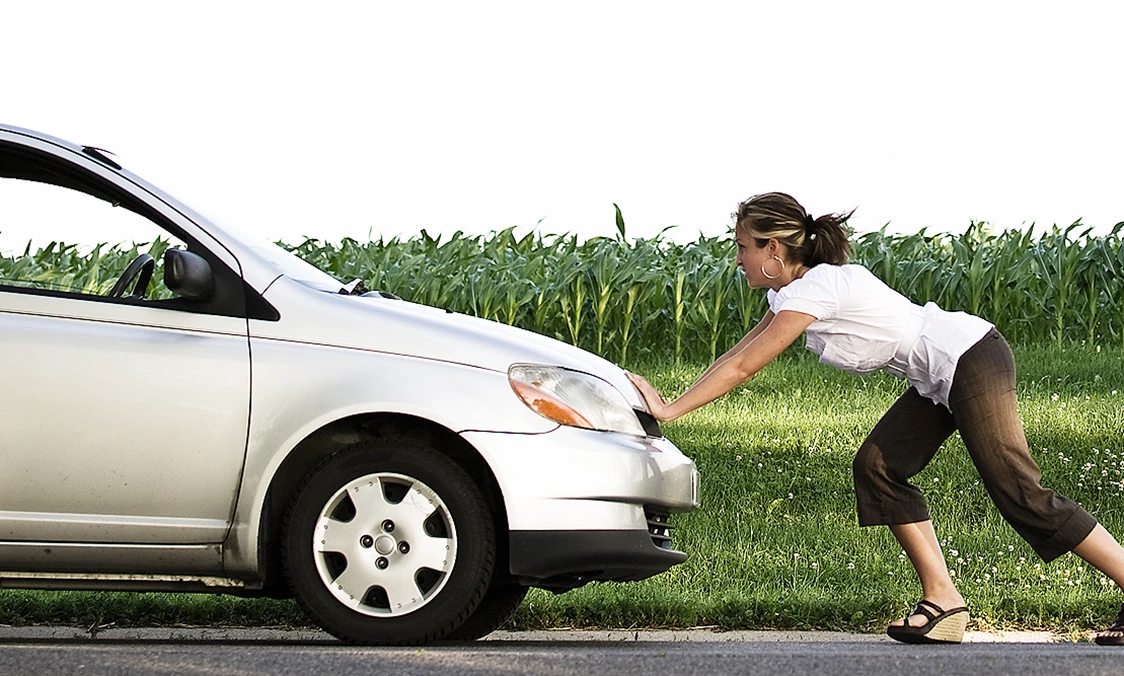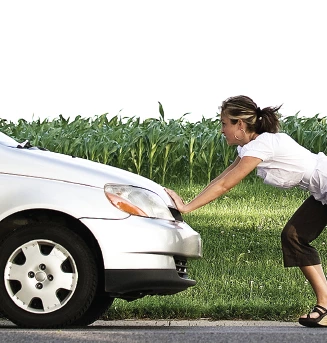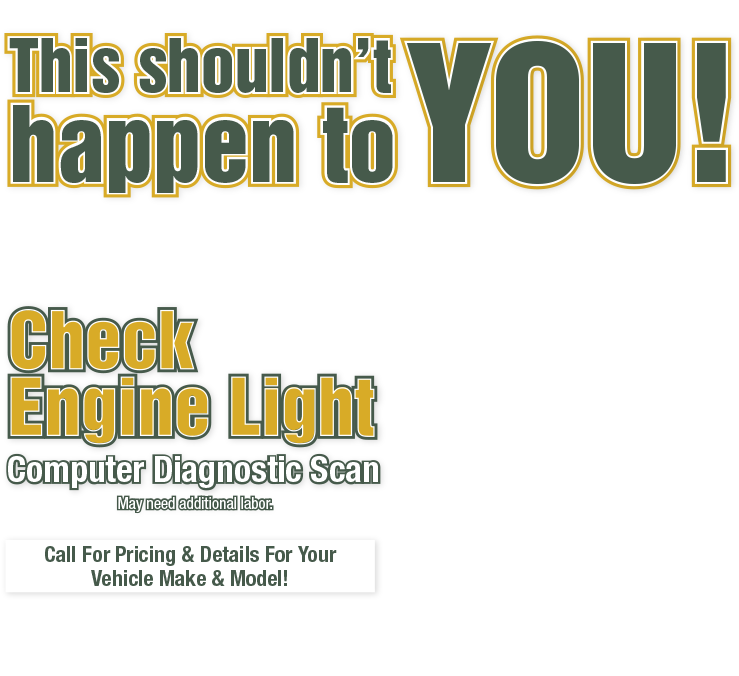This page provides answers to some of the most frequently asked questions about vehicle repair and service. We've thrown in some of our favorite tips and recommendations, too. Please call us or consult our Contact Us page for answers to your specific questions. We are happy to assist you!
Tires
-
How much air should I put in my tires?
Proper inflation is the single most important part of tire care. Check or adjust inflation every few months and always use the inflation recommended by the vehicle manufacturer. Checking air pressure should be standard procedure on any routine visit to your vehicle service center for oil services, tire rotations, or general maintenance and repair.
For do-it-yourselfers you can find this information in your owner's manual, posted on the edge of the driver's door, on a door post, in the center console, or on the inside of the glovebox door. Be sure to check inflation when tires are COLD: when the vehicle has been driven less than a mile or one hour or more after driving. Use a good quality tire gauge. And don't forget to check the spare!
-
Can I drive normally on my spare tire?
Many newer vehicles come equipped with a temporary spare, sometimes called a "donut". These tires are usually much smaller than the other tires on your car. It is important to realize that these spares have far more limitations than a typical tire, including speed and recommended driving distance. No more than 50mph and drive no further than 50 miles on the "donut" temporary spare.
-
An illuminated light on my dash shows that I have a low tire. Can I just put air in it?
In many cases correcting the air pressure in your tires will extinguish the Tire Pressure Monitoring System (TPMS) warning light. Often seasonal temperature drops will lower tire air pressure a few pounds (a good case for Nitrogen – see 11 above) and trigger the TPMS warning light. In all cases where one or two particular tires are significantly lower than the others, or lower than the factory recommended pressure, a trained tire technician should examine the tire to determine the cause and examine the casing for signs of over stress. Some TPMS systems require special tools to access the vehicle computer. Advanced level tire technicians are trained and equipped for this technology.
Vehicle Maintenance
-
What are the consequences of postponing maintenance?
Many parts on your vehicle are interrelated. Ignoring maintenance can lead to trouble: specific parts, or an entire system, can fail. Neglecting even simple routine maintenance, such as changing the oil or checking the coolant, can lead to poor fuel economy, unreliability, or costly breakdowns. It also may invalidate your warranty. Properly maintaining your vehicle is less expensive than repairs from negligence.
-
Is it really necessary to replace my timing belt at the recommended interval?
YES. The failure of a timing belt in many cars can result in major engine damage. The cost of repairing an engine with a broken timing belt is much greater than the cost of a timing belt replacement.
-
What does it mean if my "check engine" or "service engine soon" light comes on?
There are many sensors and computerized components that manage your vehicle’s engine performance and emissions. When one of these fails, the "check engine" light is illuminated. Although your car may seem to run fine, it is important to have the issue addressed to prevent long-term problems.
-
With the change of the season and the temperatures, do I need to have my car checked?
It is a good idea to have your coolant checked to determine its freezing and boiling points to verify whether it needs to be changed. Have your air conditioner tested before the summer heats up, it is cheaper to fix before the season gets started.
Vehicle Fluids
-
I have a leak under my car. How can I tell what is leaking?
The coloring of the liquid identifies the type of liquid. Coolant Fluid is orange or green, Engine fluid is Brown or Black, Transmission Fluid is Red or Pink, Power Steering Fluid is Light Brown, Differential Fluid- Brown. depending on the leak it could mean trouble, don't wait until it's too late!
Vehicle Smells & Sounds
-
My car is making a terrible sound, what information will help?
Squeaks, squeals, rattles, rumbles, and other sounds provide valuable clues about problems and maintenance needs. Here are some common noises and their definitions.
Squeal - A shrill, sharp noise, usually related to engine speed.
Click - A slight sharp noise, related to either engine speed or vehicle speed.
Screech - A high-pitched, piercing metallic sound; usually occurs while the vehicle is in motion.
Rumble - a low-pitched rhythmic sound.
Ping - A high-pitched metallic tapping sound, related to engine speed.
Heavy Knock - A rhythmic pounding sound..
Clunk - A random thumping sound.
The more details you can provide us, the better chance of locating the problem quickly. Does the noise occur when the engine is cold or warm? Hot or cold outside, rainy or dry? Does the noise occur while driving or only when parked? These clues help the technician diagnose your problems faster, saving you time and money!
-
I hear an intermittent noise from the front of my car. Do I need to worry about it?
Every noise should be checked by a qualified technician. Use you best judgment, if it sounds bad, get it checked right away. Quick action on a problem can many times save big dollars.
Oil Change
-
When should I get my oil changed?
You should get your oil changed every 3000 miles or as recommended in your vehicle’s owner’s manual.
-
What is synthetic motor oil?
Synthetic motor oils can be a good choice for high output, turbocharged or supercharged engines, vehicles that are used for towing (especially during hot weather), or vehicles that are operated in extremely cold or hot climates.
Synthetic motor oils, though several times more expensive than mineral-based motor oils, can improve fuel economy and provide longer intervals between changes. They also provide instant lubrication on start-up.
Troubleshooting
-
What should I do if my car starts to overheat?
This is a very serious problem – if your car overheats for too long, you can damage your engine. As soon as possible, find a safe place to pull off the road and shut the engine off! Do not attempt to check the fluid level in the radiator as it can burn you. The best thing to do is have your car towed to a repair shop.
-
What dashboard lights should I worry about and which are just precautions?
Every dashboard light is responsible for notifying the owner of issues that need to be addressed. If any of the following lights are lit you need to have your vehicle looked at: Engine light, Oil light, ABS light, Traction light, Tire Pressure light.
Electrical System
Cabin Air Filters
-
Why are Cabin Air Filters important?
Air quality is becoming a major concern for many people - outdoors, in our homes, and now even in our automobiles. An estimated 50 million Americans suffer from hay fever and other allergy-related problems.
-
What happens if they are not replaced at the recommended interval?
In addition to the possibility of unpleasant odors, filters that have been left in service for over 20,000 miles can result in decreased heating and air conditioning performance caused by restricted air flow through the cabin air filter.









